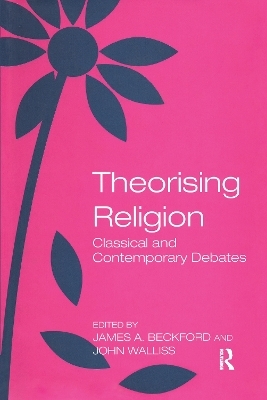
Theorising Religion
Routledge (Verlag)
978-1-032-18011-3 (ISBN)
Religion is controversial and challenging. Whilst religious forces are powerful in numerous societies, they have little or no significance for wide swaths of public or private life in other places. The task of theoretical work in the sociology of religion is, therefore, to make sense of this apparently paradoxical situation in which religion is simultaneously significant and insignificant. The chapters of Part One consider the classical roots of ideas about religion that dominated sociological ways of thinking about it for most of the twentieth century. Each chapter offers sound reasons for continuing to find theoretical inspiration and challenge in the sociological classics whilst also seeking ways of enhancing and extending their relevance to religion today. Part Two contains chapters that open up fresh perspectives on aspects of modern, post-modern and ultra-modern religion without necessarily ignoring the classical legacy. The chapters of Part Three chart new directions for the sociological analysis of religion by fundamentally re-thinking its theoretical basis, by extending its disciplinary boundaries and by examining previously overlooked topics.
James A. Beckford is Professor of Sociology at the University of Warwick, UK, and John Walliss is Lecturer in Sociology at Liverpool Hope University, UK.
Contents: Introduction, James A. Beckford and John Walliss. Part I Classical Roots: Religion as an elementary aspect of society: Durkheim's legacy for social theory, Philip A. Mellor; Weber, rationalisation, and religious evolution in the modern era, Colin Campbell; Spiritualism and the (re)enchantment of modernity, John Walliss; Trajectories of faith in the global age: classical theory and contemporary evidence, Frank J. Lechner; 'Magico-popular religion' in contemporary society: towards a post-western sociology of religion, Cristián Parker. Part II New Growth: Religion in ultramodernity, Jean-Paul Willaime; Theodicy, distribution of risk, and reflexive modernisation: explaining the cultural significance of new religious movements, Robert A. Campbell; Privatisation, globalisation and religious innovation: Giddens' theory of modernity and the refutation of secularisation theory, Lorne L. Dawson; From creeds to burgers: religious control, spiritual search and the future of the world, John Drane; Understanding honour and religion as resource and constraint for young British Asians, Hannah Bradby; Preference structures and normative constraints in movements outside, between and within religious organisations, Darren E. Sherkat. Part III Fresh Blooms: Narrative versus theory in the sociology of religion: five stories of religion's place in the late modern world, James V. Spickard; 'A minimalist sociology of religion'?, James A. Beckford; New media, niche markets, and the body: excarnate and hypercarnate challenges for theory and theology, David Lyon; Inner speech and religious traditions, Douglas J. Davies; Sickness and salvation: social theories of the body in the sociology of religion, Freda Mold; Breaching bleaching: integrating studies of 'race' and ethnicity with the sociology of religion, Matthew Wood. Index.
| Erscheinungsdatum | 01.10.2021 |
|---|---|
| Verlagsort | London |
| Sprache | englisch |
| Maße | 156 x 234 mm |
| Gewicht | 394 g |
| Themenwelt | Geschichte ► Teilgebiete der Geschichte ► Religionsgeschichte |
| Geisteswissenschaften ► Religion / Theologie | |
| Sozialwissenschaften ► Soziologie ► Allgemeines / Lexika | |
| ISBN-10 | 1-032-18011-0 / 1032180110 |
| ISBN-13 | 978-1-032-18011-3 / 9781032180113 |
| Zustand | Neuware |
| Informationen gemäß Produktsicherheitsverordnung (GPSR) | |
| Haben Sie eine Frage zum Produkt? |
aus dem Bereich


